|
Andrew Young only published
one book of poems and hymns, and that was in 1876 when he was sixty-nine
years of age and retired from teaching. His selection comprises one lengthy
work, 'The Highlands of Scotland', that runs to eighty-one nine-line
stanzas, some hymns, and many elegiac offerings. From among these last the
reader can share Andrew's grief from the loss of his young wife Maria on the
7th of December, 1847, and then their daughter, also Maria, on the 26th of
December, 1847, aged three and a half years.
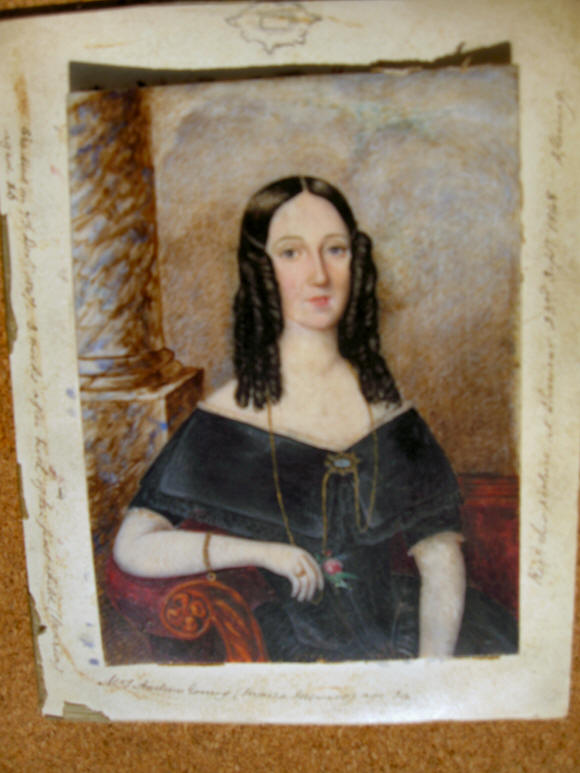
Maria Marvin (Picture courtesy of Andrew Savage)
Many years
ago (before the internet) I purchased an unframed miniature
painting on ivory, of a young lady, at an auction sale. In
addition to the painting I was attracted to the writing
around the mount which is as follows:
Left side: She died on 7th December 1847
- 3 weeks after the birth of her first child (Maria)
Bottom: Mrs Andrew Young (Maria Marvin)
age 24
Right side: Received this picture at
?????? 23rd September 1848 - A Young
Reverse painted by J ?????? Oct. 1845
NB ???? denotes difficult to
interpret.
A couple of days ago, on an off chance, I
typed Maria Marvin into google and came up with your website
and information about Andrew Young and his first wife Maria
Marvin.
Given the poetry Andrew wrote in memory
of his lost wife it may be nice for the image of Maria to be
connected with the information on your website.
The picture would also suggest that Maria
child died just weeks after her own death and not at the age
3.5 years.
Andrew Savage
Andrew Young Family Elegies
(pdf)
The revelations surrounding
these sad events in a number of the elegies provide clues for an exploration
of Andrew and his wife Maria's origins via genealogical
birth/marriage/census/death data and post-1855 registration images. These
provide snapshots of Andrew's subsequent life until it ends in 1889, when
his death registration image in Edinburgh in 1889 confirms, not only
previous findings about his parentage, but also his second marriage in 1851.
There is no explicit mention in his poems about events during this
thirty-eight year-long marriage, although he and his wife Christina Allan
had one child, a daughter Catherine, born in 1852.

Andrews parents' marriage is
recorded thus,
DAVID YOUNG
Spouse: MARGARET MIRRAYLIES
Marriage: 06 MAR 1804 Canongate, Edinburgh, Midlothian, Scotland
Extracted marriage record for locality listed in the record.
Andrew Young's birth does not appear in the Old Parish Records, but an
anonymous source gives it thus,
23 APR 1807 Edinburgh, Midlothian, Scotland
Father: David Young
Andrew's wife Maria's birth in London is recorded thus,
MARIA SOPHIA ISABELLA MIVART
Birth: 12 MAY 1821
Christening: 24 AUG 1821 Saint James, Westminster, London, England
Father: JOHN MIVART
Mother: MARIA
Extracted birth or christening record for the locality listed in the record.
The 1841 Census for Marylebone shows the Mivart family with Head of Family,
John, aged c. 40, employed as an 'Upholder', Maria his wife, a teacher of
music, also aged c. 40, daughter Maria, also a music teacher, aged 19, plus
three more younger children, Emma, Alfred and Edmund.
In his first elegy on his
wife's death, Andrew states that she was 26 years old when she 'slept' away,
and this equates well with Maria's birth date, and her age given in the 1841
Census.
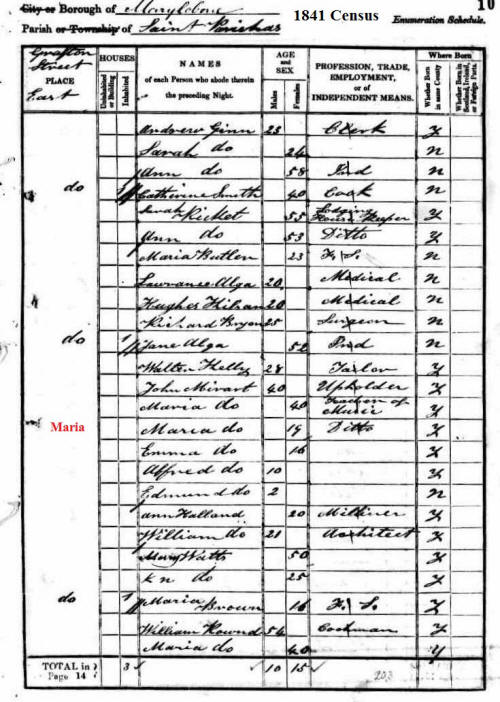
With Andrew not appearing to
be recorded in the 1841 Census for Scotland, the next we hear of him is his
marriage in St Andrews, Scotland in 1844 .....
ANDREW YOUNG
Spouse: MARIA ISABELLA MIVART
Marriage: 20 APR 1844 St. Andrews And St. Leonards, Fife, Scotland
Extracted marriage record for locality listed in the record.
Then, the 1847 Old Parish Records reveal the following .....
Death: 07/12/1847
MARIA [MIVART] YOUNG .... Spouse: ANDREW YOUNG
F ST ANDREWS AND ST LEONARDS /FIFE
Extracted death record for locality listed in the record
Death: 26/12/1847
MARIA SOPHIA MIVART YOUNG .... Father: ANDREW YOUNG
F ST CUTHBERT'S EDINBURGH CITY CITY/MIDLOTHIAN
Extracted death record for locality listed in the record
What Andrew had been doing in St Andrews emerges in the 1851 Census ...

After four years he marries
again ....
ANDREW YOUNG
Spouse: CHRISTINA LOTHIAN ALLAN
Marriage: 07 AUG 1851 Saint Cuthberts, Edinburgh, Midlothian, Scotland
Extracted marriage record for locality listed in the record.
He is clearly still teaching in St Andrews as his banns were called there
...
ANDREW YOUNG
Spouse: CHRISTINA LOTHIAN ALLAN
Marriage: 02 AUG 1851 St. Andrews And St. Leonards, Fife, Scotland
Extracted banns record for locality listed in the record.
and they soon have a child ....
CATHERINE MARGARET YOUNG
Birth: 06 OCT 1852
Christening: 06 NOV 1852 St. Andrews And St. Leonards, Fife, Scotland
Father: ANDREW YOUNG
Mother: CHRISTINA ALLAN
Extracted birth or christening record for the locality listed in the record.
The 1861/1871/1881/1891 Censuses show that Christina survived until at least 1891
and that by then daughter Catherine was still a spinster.
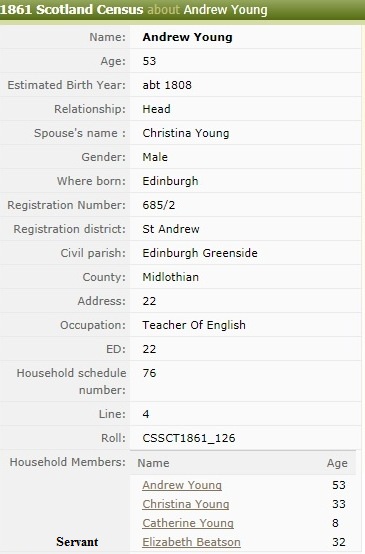
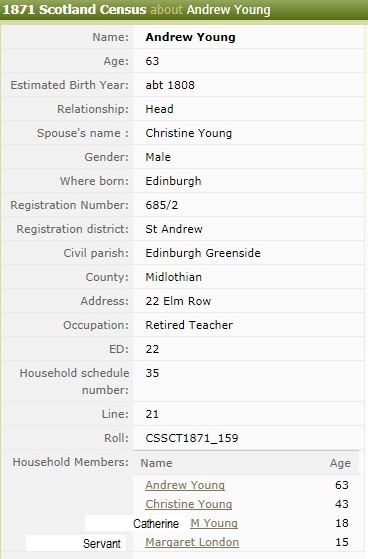

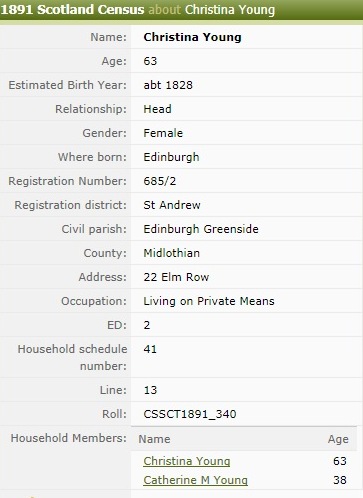
The Highlands Of Scotland Poem
(pdf)
The Highlands Of Scotland
Notes (pdf)
The complete book is available at,
http://www.archive.org/details/scottishhighlan01youngoog
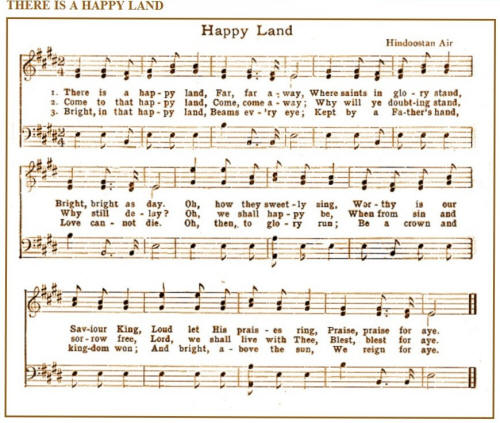
There Is a Happy Land
by Andrew Young
There is a happy land, far, far away,
Where saints in glory stand, bright, bright as day;
Oh, how they sweetly sing, worthy is our Savior King,
Loud let His praises ring, praise, praise for aye.
Come to that happy land, come, come away;
Why will you doubting stand, why still delay?
Oh, we shall happy be, when from sin and sorrow free,
Lord, we shall live with Thee, blest, blest for aye.
Bright, in that happy land, beams every eye;
Kept by a Fatherís hand, love cannot die;
Oh, then to glory run; be a crown and kingdom won;
And, bright, above the sun, we reign for aye.
The words to "There is a
Happy Land" were written by Andrew Young in 1838. They were adapted to a
Hindustani air (often called "Indian
Love Song") by Leonard P. Breedlove in 1850. Andrew Young (1807-1889)
was born in Edinburgh, Scotland, and was a Scottish schoolmaster and poet
who served as the headmaster of the English department of Madras College, St
Andrews, Scotland. He wrote "There is a Happy Land" based on the lyrics of a
popular parlor song which began: "I've come from a happy land..." because he
thought the words could be adapted for Sunday school use. |

